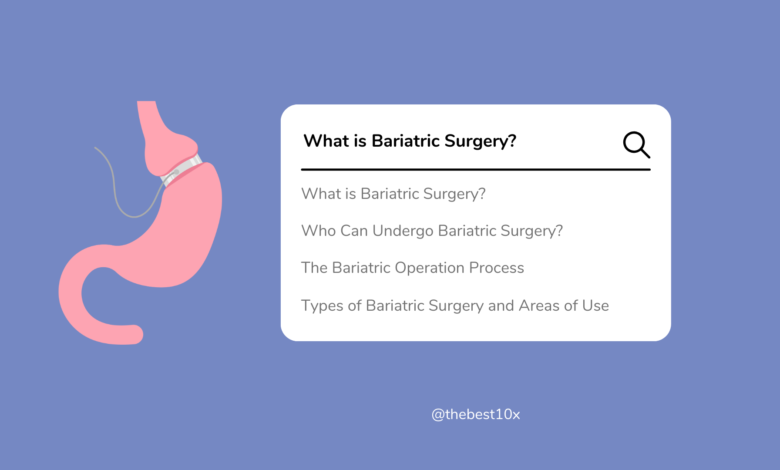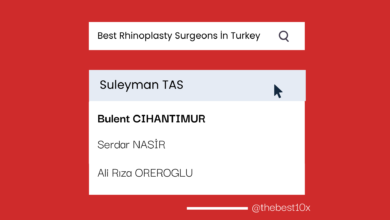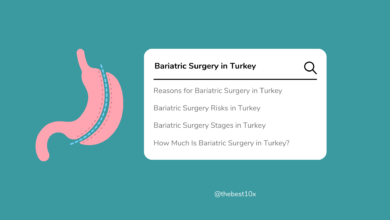
What is Bariatric Surgery? What Are Its Types?
Bariatric surgery refers to a collection of surgical procedures used in the treatment of extreme obesity or obesity-related health problems. These medical interventions are aimed at promoting fat loss by reducing body weight and, along with weight loss, can help improve obesity-related health problems such as type 2 diabetes, hypertension, sleep apnea. Bariatric surgery offers a long-term solution to obesity and is often considered an option for individuals who are struggling to cope with lifestyle changes and diet therapy. In this article, we will examine the different types of bariatric surgery and how each of them works.
Bariatric surgery is the generic name for surgical procedures used to treat extreme obesity. Such surgical interventions are performed in order to alleviate or eliminate obesity-related health problems, promote weight loss and improve the quality of life of patients. Bariatric surgery often offers a solution for individuals who are struggling to cope with traditional weight loss methods such as diet and exercise, or who are struggling with obesity-related diseases. These surgical methods may include different techniques, such as reducing the volume of the stomach, redirecting the intestines, or partially disabling them. In addition to helping the patient lose weight, bariatric surgery can also correct obesity-related health problems such as type 2 diabetes, hypertension and sleep apnea. However, these procedures require a serious medical intervention and should be treated as part of lifestyle changes with careful evaluation.
What Are The Goals Of Bariatric Surgery?
Beauty and an aesthetic appearance are an important element that increases the self-confidence of individuals. However, another factor that should be considered as part of not only the external appearance, but also health is weight management. It is at this point that bariatric surgery comes into play.
Bariatrik cerrahi, aşırı obeziteyi tedavi etmeyi amaçlar ve bu süreçte bir dizi önemli hedefi vardır:
Functional Purposes
Improving Health: The main functional purpose of bariatric surgery is to improve health in overweight or obese individuals. This surgery contributes to the treatment of health problems that are related to obesity or trigger obesity. In particular, it can relieve the symptoms of diseases such as type 2 diabetes, hypertension, sleep apnea or control these diseases.
Facilitating Breathing: Overweight or obese individuals may experience breathing and breathing problems. Bariatric surgery aims to solve these breathing problems.
Better Ability to Move: Obesity can limit physical activities. Weight loss after bariatric surgery can help patients lead a more active life and perform their daily activities more comfortably.
Aesthetic Purposes
Improvement of Body Profiles: Bariatric surgery for aesthetic purposes aims to make the contours and contours of the body look more balanced and attractive.
Increasing Self-Esteem: Individuals’ self-esteem for their bodies may increase after bariatric surgery for aesthetic purposes. Those who apply for this surgery in order to get a new look and feel better can increase their self-esteem.
Bariatric surgery is a surgical approach that can address both functional and aesthetic purposes and can serve the purpose of improving both the health and appearance of individuals.
Who Can Undergo Bariatric Surgery?
Bariatric operations are surgical interventions performed in order to promote weight loss and address health problems of overweight or obese individuals. However, these operations are not suitable for everyone. Here is a guide that examines candidates who are suitable for bariatric operations and who are not:
| Status / Criteria | Suitable Candidates | Ineligible Candidates |
| Aesthetic Concerns | People who are uncomfortable with the opinion caused by their excess weight | -People who are satisfied with their physical appearance and are undecided about changes |
| Functional Problems | -People who have problems with breathing and movement comfort due to excess weight | People with health problems that may be triggered by surgical intervention |
| Health Status | People with diseases caused by weight | -Those who have health problems that prevent surgery, such as blood clotting problems, heart disease or high blood pressure |
| Psychological Preparation | -People who are psychologically ready for the lifestyle changes that the operation will bring | -Those who are not ready for the physical and emotional changes that may occur after the operation or those who refuse to receive psychological support |
The Bariatric Operation Process
Bariatric surgery is a surgical procedure performed to treat obesity and improve the health of patients. This operation process consists of a series of steps and supports the patient’s weight loss.
Here are the basic steps of the bariatric surgery operation process:
Application and Evaluation
A person who is a candidate for bariatric surgery applies to an obesity specialist or surgeon. After the application, the patient’s medical history, obesity history and weight loss trials are examined. A physical examination is performed and laboratory tests are ordered to assess whether the patient is a suitable candidate for surgery.
Psychological Evaluation
The patient is evaluated by a psychologist or psychiatrist. This assessment aims to evaluate the psychological factors associated with obesity. The patient’s ability to adapt to lifestyle changes after surgery and the need for psychological support after surgery are determined.
Diet and Lifestyle Changes
During the preoperative period, weight loss goals are set to the patient and a nutrition plan is created by the dietitian. In addition, the patient’s physical activity level can be increased and healthy lifestyle habits are acquired.
Selection of Surgery
After being evaluated as a suitable candidate, it is determined which bariatric surgery method is most suitable for the patient. Methods may include options such as gastric bypass, gastric tube surgery, and Decastebl gastric band. The surgeon determines the best option, taking into account the patient’s specific condition and weight loss goals.
Operation
When the day of surgery arrives, it is ensured that the patient is properly prepared for the operation. Bariatric surgery is usually performed by laparoscopic (closed) method and small incisions are made in the patient’s abdominal area. During the operation, the stomach is reduced or changes are made to the digestive tract, so that less food is eaten and the absorption of nutrients is reduced.
Postoperative Care
During the postoperative period, the patient is kept under observation in the hospital for a while. Wound healing and nutrition monitoring are important in this process. The patient is given a dietary guide after surgery and the physical activity level is slowly increased.
Follow-Up and Support
After the surgery, the patient’s weight loss process is monitored and nutritional counseling and psychological support are provided when necessary. In addition, it is important that the patient regularly goes to doctor’s check-ups.
Bariatric surgery can be an effective option for many people struggling with obesity, but cooperation and a long-term commitment between the patient and the surgeon are required in this process. Dec. Every patient is different, so the pre- and postoperative process is planned and evaluated individually.
Types Of Bariatric Surgery And Areas Of Use
Bariatric surgery includes various surgical procedures performed to treat obesity and support weight loss. These surgical procedures aim to control obesity and improve health by using different methods and techniques.
Here are the types of bariatric surgery and the situations in which it can be performed:
Gastric Bypass
Gastric bypass is a bariatric surgery method that is widely used to treat obesity. During this procedure, the stomach is shrunk and connected directly to the small intestine by omitting part of it. This reduces the capacity to eat and limits the absorption of nutrients. Gastric bypass can be an effective option in the treatment of health problems such as obesity-related type 2 diabetes, high blood pressure and sleep apnea.
Tube Stomach Surgery (Sleeve Gastrectomy)
Tube stomach surgery is a surgical procedure performed to shrink the stomach. During this procedure, the stomach is cut lengthwise and left in the form of a smaller tube. This reduces the capacity to eat and reduces the production of the hunger hormone ghrelin. Gastric sleeve surgery is an effective method used to treat obesity and is usually preferred in the fight against overweight, which leads to other health problems.
Ajustebl Gastrik Bant (Lap Band)
An agustebl gastric band is a bariatric surgical procedure that restricts nutrient intake by using a type of band that compresses the stomach. This band divides the stomach into two parts, the upper compartment becomes smaller and the lower compartment becomes larger. The tape is compressed, allowing nutrients to pass into the stomach more slowly. The Ajustebl gastric band is used as a less invasive option compared to other bariatric surgery options.
Biliopankreatik Diversiyon (BPD)
Biliopancreatic diversion is a bariatric surgical procedure performed to shrink the stomach and reorganize the intestines. During this procedure, the stomach is greatly reduced in size and the small intestines are redirected. BPD may be a preferred option in cases of extreme obesity, but it is a method that should be carefully considered because it affects nutrient absorption more.
Laparoscopic Surgery (Minimally Invasive Surgery)
Bariatric surgery procedures can be performed with minimally invasive methods, also known as laparoscopic surgery, instead of traditional open surgery. This is a surgical approach performed with smaller incisions and endoscopic devices. Laparoscopic surgery can speed up the healing process and allows patients to stay in the hospital for a shorter period of time.
Any bariatric surgery procedure is determined depending on the patient’s specific condition, weight loss goals, and state of health. These surgical procedures can be an effective option to treat obesity-related health problems and support weight loss, but require lifestyle changes and regular follow-up after surgery. It is important to conduct a comprehensive assessment with the relevant health professionals.
Bariatric Surgery Recovery And Care Process
Bariatric surgery is a type of operation performed for the purpose of weight loss. It is critical for patients to take careful and correct steps in the postoperative period for a healthy recovery process. Here’s what you need to know about the recovery and care process after bariatric surgery:
The First Period Spent Under Observation in the Hospital: After bariatric surgery, patients are usually kept under observation in the hospital for several days. In this process, their postoperative condition is closely monitored and necessary medical interventions are performed.
Liquid Diet Period: In the postoperative period, patients switch to a liquid diet. During this period, only liquid foods are consumed and used to acclimatize the stomach slowly.
Puree Period: After the liquid diet, patients begin to consume puree-like foods. In order not to damage the stomach after surgery, food is crushed thoroughly during this period.
Slowly Switching to Solid Foods: After the mash period, patients slowly switch to solid foods. During this period, food should be thoroughly chewed and the digestive system should be accustomed.
Taking Supplements: After bariatric surgery, patients should regularly take vitamin and mineral supplements recommended by their doctors. These supplements help to prevent nutritional deficiencies after surgery.
Physical Activity and Exercise: Regular physical activity and exercise in the postoperative period can help accelerate weight loss. However, it is important that these activities are carried out under the supervision of a doctor. Doctor’s Checkups: It is important to go to regular doctor’s checkups after bariatric surgery to follow the recovery process. Your doctor will monitor your weight loss and health status.
Participation in Support Groups: Participating in support groups after bariatric surgery can help patients share their experiences and support each other.
Remember that the recovery process after bariatric surgery may differ for each patient. Following your doctor’s recommendations and consulting a doctor when necessary is one of the most important steps for a healthy recovery process. After bariatric surgery, care and careful behavior are the key to a successful weight loss process.
Frequently Asked Questions About Bariatric Surgery
How much weight can I lose after bariatric surgery?
Weight loss can vary depending on a person’s initial weight, the type of surgery, and lifestyle. However, bariatric surgery usually provides a significant weight loss in obesity patients. A large part of the body weight is lost in the first few years.
How long should I follow a liquid diet after bariatric surgery?
The duration of the liquid diet may vary depending on the type of surgery performed. Usually, patients follow a liquid diet for the first few days after surgery. Then slowly puree, and then the transition to solid foods is made. This process should be adjusted according to the recommendations of your doctor.
Which supplements should I use after bariatric surgery?
It is important for patients after bariatric surgery to use supplements recommended by their doctors to prevent vitamin and mineral deficiencies. These supplements usually contain important nutrients such as iron, calcium, vitamin B12.
When can I do physical activity after surgery?
The time to start physical activity may vary depending on the type of surgery and the person’s general state of health. But usually patients can start light exercises such as slow-paced walking during the postoperative period. Doctor’s approval is important before starting more intense activities.
How long should I go to doctor’s checkups after bariatric surgery?
Doctor’s controls are important to ensure the healthy progress of the postoperative period. More frequent checkups may be done during the first year, then you can continue to checkups as often as your doctor recommends.
Are the weight loss results permanent after bariatric surgery?
Weight loss results can be permanent depending on a person’s lifestyle and dietary habits. But to achieve lasting results, it is important to exercise regularly and maintain a healthy diet.
What side effects may I experience after bariatric surgery?
Common side effects after bariatric surgery may include swelling, Decays, constipation or diarrhea, heartburn, and rarely nutritional deficiencies. It is often possible to correct or manage these side effects.
As stated in the entire content, since bariatric surgery is an important step to solve a person’s obesity problem and improve his health, the choice of surgeon plays a very critical role. Choosing a suitable surgeon is of vital importance in order to achieve the desired results and minimize the risk of complications. A specialist and experienced bariatric surgeon in his field evaluates the specific needs of the person, creates a treatment plan specific to the person and performs the operation safely. When choosing a surgeon, it is critical to make the right decision that will increase your satisfaction after surgery by paying attention to the surgeon’s references, experiences and achievements. Therefore, it is a vital step for the best bariatric surgeon surgical doctors to make this important decision consciously before surgery.




